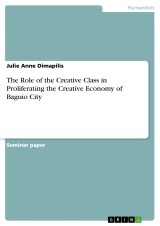Details

The Role of the Creative Class in Proliferating the Creative Economy of Baguio City
1. Auflage
|
13,99 € |
|
| Verlag: | Grin Verlag |
| Format: | |
| Veröffentl.: | 23.09.2020 |
| ISBN/EAN: | 9783346252791 |
| Sprache: | englisch |
| Anzahl Seiten: | 15 |
Dieses eBook erhalten Sie ohne Kopierschutz.
Beschreibungen
Seminar paper from the year 2019 in the subject Social Studies (General), grade: 1.00, University of the Philippines (College of Social Sciences), course: Historical Perspectives on Development, language: English, abstract: The paper attempts to understand the role of the creative class in the proliferation of a creative economy in Baguio City. It draws discussion from the discourse of the reconstruction of Baguio City as a Creative City and from the insights gained by the author during the International Conference on Southeast Asian Crafts and Folk Arts (ICSEACFA). This paper will synthesize empirical specifics and theoretical posits in order to arrive at a deeper and broader understanding of the creative class and the creative economy in Baguio City.
The paper puts premium on the exploration as to how the creative economy is ultimately driven by the creative class. Through a review of empirical facts and the theories on creative economies and identifying the creative class, the author affirms the vital role, the creative class plays in the proliferation and development of the creative city.
Conversely, the development of the creative city enlivens the creative sectors and encourages them to continue innovating, becoming more productive, generating more employment, increasing household incomes, savings, and investments. Baguio City's position as a UNESCO creative city entails a lifelong commitment of the creative class in proliferating the creative economy.
Today, Baguio City is known as the “Summer Capital” of the country. It is one of the most dynamic and prominent cities in the Philippines. It is home to 345,000 residents as of 2015, and has been growing exponentially at a rate peggedm at 1.54 percent. Baguio is now comprised of migrants from various ethno-linguistic groups who have now outnumbered the original Ibaloi population. Currently, only 4% of the total Baguio population are Ibalois. It is an educational, trading, tourism, and administrative hub in northern Luzon.
The paper puts premium on the exploration as to how the creative economy is ultimately driven by the creative class. Through a review of empirical facts and the theories on creative economies and identifying the creative class, the author affirms the vital role, the creative class plays in the proliferation and development of the creative city.
Conversely, the development of the creative city enlivens the creative sectors and encourages them to continue innovating, becoming more productive, generating more employment, increasing household incomes, savings, and investments. Baguio City's position as a UNESCO creative city entails a lifelong commitment of the creative class in proliferating the creative economy.
Today, Baguio City is known as the “Summer Capital” of the country. It is one of the most dynamic and prominent cities in the Philippines. It is home to 345,000 residents as of 2015, and has been growing exponentially at a rate peggedm at 1.54 percent. Baguio is now comprised of migrants from various ethno-linguistic groups who have now outnumbered the original Ibaloi population. Currently, only 4% of the total Baguio population are Ibalois. It is an educational, trading, tourism, and administrative hub in northern Luzon.

















